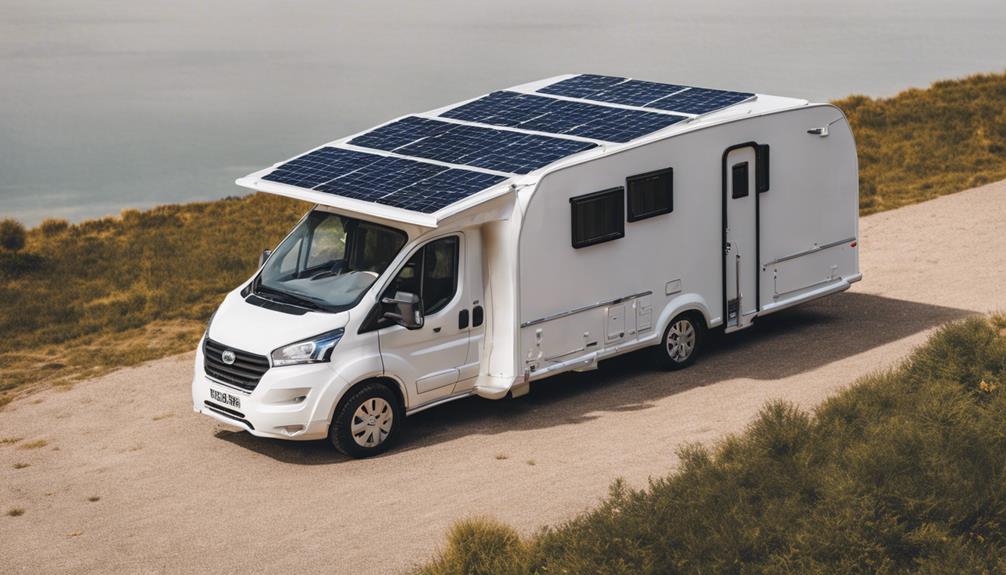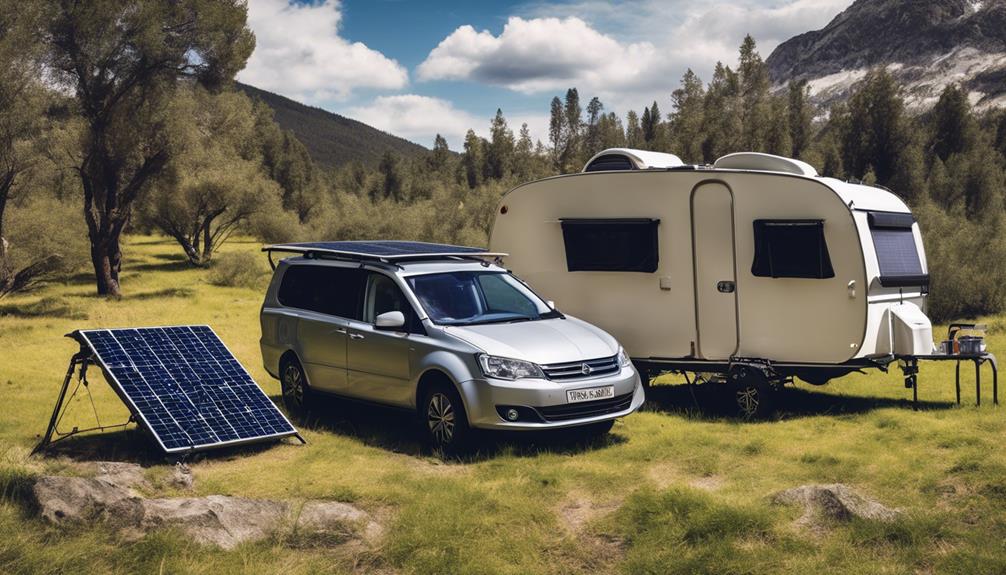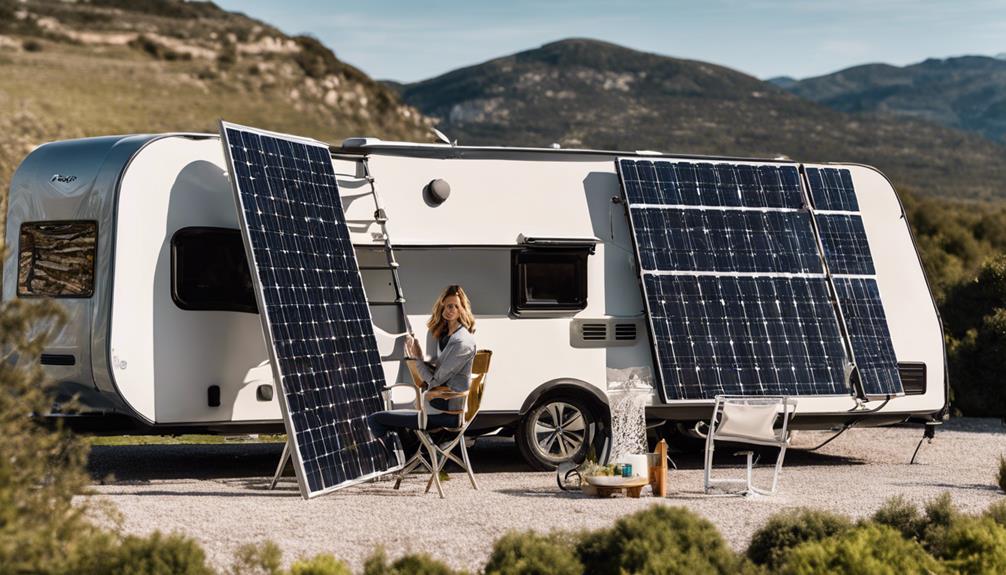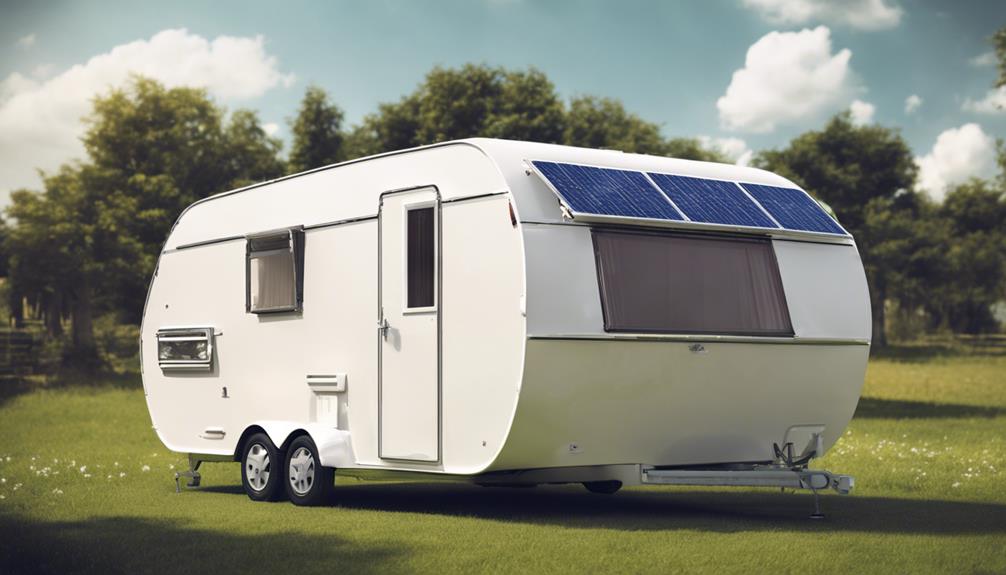When selecting solar panels for your caravan, opt for high-performance models above 20% for improved power production. Monocrystalline panels offer top performance and durability, while polycrystalline ones are cost-effective. Look for robust construction to withstand travel and weather challenges. Consider factors like energy needs and budget. Portable panels with foldable designs and lightweight materials are convenient for on-the-go use. DIY kits with wattage between 100-300 watts are ideal. Top brands like Renogy and HQST are known for performance and durability. Prioritize performance, durability, and warranty for your caravan's solar setup.
Key Features to Consider

When selecting solar panels for your caravan, it's important to take into consideration key features that will secure top performance and efficiency on the road. Solar panel efficiency is a vital factor to ponder. Look for panels with high efficiency ratings, typically above 20%, as they'll convert more sunlight into usable energy for your caravan appliances and devices.
Higher efficiency panels mean you can generate more power in limited sunlight conditions, important for your travels.
Durability and warranty are equally crucial when choosing solar panels for your caravan. Opt for panels with robust construction that can withstand the rigors of travel and varying weather conditions. Additionally, check for a dependable warranty that covers any potential manufacturing defects or damage during transit.
A solid warranty ensures that you're protected in case of unforeseen issues with your solar panels, providing you with peace of mind on the road.
Monocrystalline Vs Polycrystalline Panels
Comparing monocrystalline and polycrystalline solar panels can help you make an informed decision when selecting the most suitable option for your caravan's energy needs. Efficiency-wise, monocrystalline panels are known for their higher efficiency rates, making them a great choice if you have limited roof space on your caravan.
On the other hand, polycrystalline panels are slightly less efficient but come at a lower cost, making them a budget-friendly option for those looking to save upfront.
When it comes to durability, monocrystalline panels tend to have a longer lifespan and perform better in low-light conditions compared to polycrystalline panels. However, both types are sturdy and can withstand harsh weather conditions typically encountered during caravan travels.
In terms of the installation process, both monocrystalline and polycrystalline panels are relatively easy to install on the roof of your caravan. It usually involves securing the panels with brackets and connecting them to your caravan's electrical system.
Consider your energy needs, budget, and space availability when deciding between monocrystalline and polycrystalline solar panels for your caravan.
Portable Solar Panel Options

To explore portable solar panel options for your caravan, consider the various features and benefits that can enhance your on-the-go energy needs. When selecting a portable solar panel, solar panel efficiency is an essential factor to maximize power generation in limited space. Look for panels with high efficiency ratings to make sure you get the most out of the sunlight available.
Additionally, portable solar accessories like foldable designs, lightweight materials, and easy-to-carry handles can make setup and transportation a breeze. Opt for panels with built-in stands or mounting options for convenient placement and angle adjustments to capture sunlight efficiently. Some portable solar panels also come with integrated charge controllers and USB ports for easy connectivity to your caravan's battery system and electronic devices.
Consider the durability and weather-resistance of the panels to withstand outdoor conditions during your travels. By choosing portable solar panels with high efficiency and practical accessories, you can effectively harness solar power for your caravan's energy needs wherever you go.
Solar Panel Kits for DIY Installation
Explore the benefits of solar panel kits tailored for DIY installation to effectively power your caravan's energy requirements.
When selecting a solar panel kit for your caravan, one vital aspect to contemplate is the solar panel wattage. The wattage of the solar panels determines the amount of energy they can generate. For caravans, a wattage ranging from 100-300 watts is typically adequate to power necessary appliances and electronics.
The setup process of solar panel kits intended for DIY installation is usually simple and user-friendly. Most kits include detailed instructions that walk you through the installation process step by step. Generally, the setup entails securing the solar panels on the roof of your caravan using brackets, connecting the panels to a charge controller, and then linking the controller to your caravan's battery system. It's crucial to ensure proper alignment of the panels to optimize sun exposure and energy production.
Top Brands in the Market

Explore reputable brands in the market renowned for their quality solar panel kits suitable for DIY installation on caravans. When examining top brands, it's essential to look at solar panel efficiency ratings, which indicate how well the panels convert sunlight into electricity.
Renogy is a standout brand known for its high efficiency ratings, ensuring maximum power generation for your caravan. Another reputable brand is HQST, offering durable solar panels with excellent efficiency levels, ideal for off-grid adventures.
In addition to efficiency, solar panel durability and warranty are key factors to take into account when choosing a brand. Grape Solar is a brand recognized for its robust and long-lasting panels, providing peace of mind for caravan owners. Their extended warranty further enhances the reliability of their products.
Eco-Worthy is another brand that highlights durability, offering sturdy panels that can withstand various weather conditions while providing efficient power output.
Frequently Asked Questions
Can Solar Panels Charge My Caravan Battery While Driving?
While driving, solar panels can efficiently charge your caravan battery. The solar panel's efficiency and battery charging capabilities guarantee a steady power supply for your caravan's electrical needs, making it a convenient and eco-friendly option.
Are Flexible Solar Panels Suitable for Curved Caravan Roofs?
When considering flexible solar panels for curved caravan roofs, guarantee a proper installing process to maintain efficiency. Evaluate durability against potential damage. Aesthetics play a role too, as panel appearance can impact the overall caravan design.
How Do I Protect My Solar Panels From Theft While Parked?
To protect your solar panels from theft, implement anti-theft measures like locks and alarms. Utilize remote monitoring for added security. Camouflage techniques and security stickers can deter thieves. Stay vigilant to safeguard your valuable investment.
Can I Connect Multiple Solar Panels for Increased Power?
Yes, you can connect multiple solar panels for increased power. Verify that the solar panel size and wiring configurations match to optimize efficiency. By connecting them in parallel or series, you can boost the energy output for your caravan.
Are There Any Grants or Incentives for Installing Solar Panels on Caravans?
Yes, there are government incentives available for installing solar panels on caravans. These incentives aim to promote the use of renewable energy sources and can greatly enhance the cost-effectiveness of your solar panel investment.
Conclusion
To sum up, when selecting the best solar panels for your caravan, take into account key features such as efficiency, durability, and portability. Choose monocrystalline panels for greater efficiency or polycrystalline panels for a more cost-effective choice.
Explore portable solar panel alternatives for versatility and straightforward installation. Evaluate solar panel kits for a DIY setup process.
Leading brands in the industry like Renogy, HQST, and Go Power provide dependable and top-notch products for your caravan solar requirements.
